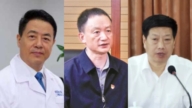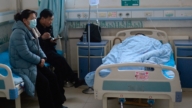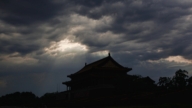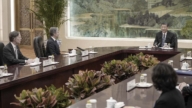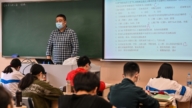【新唐人2013年02月19日訊】習近平將在3月接任國家主席職務,按照國際慣例,新領導人上任後首次出訪,一般代表著本國外交政策取向。因此,蛇年伊始,外交部長楊潔篪17號開始的對南非和俄羅斯的訪問,被認爲是為習近平3月份的出訪「鋪路」。
在目前國際和國內形勢複雜多變的情況下,習近平爲甚麽可能選擇俄羅斯作爲上任後,首個出訪的國家呢?對此,評論人士有著不同的分析和解讀。
前中國大陸史學教授劉因全分析,將俄羅斯作爲出訪第一站,習近平可能有三方面考量。
前中國大陸史學教授劉因全﹕「第一就是日本問題,中國為了對付日本,就會考慮加強和俄國的同盟。第二個問題是朝鮮核武器問題,他有可能謀求和俄國共同向朝鮮施加壓力。第三個問題就是越南問題,習近平很可能希望俄國減少對越南的軍事支持,這樣在南海問題上,中國會比較有力的向越南施加壓力。」
時政評論家藍述則認爲,將俄羅斯作爲首訪國,背後可以看出習近平和軍方微妙的關係。因爲習近平要想穩定中共的統治,就必須獲得軍隊的絕對領導權。為了進一步討好中共軍隊裡鷹派的勢力,習近平在一系列政策上,都選擇向鷹派妥協。
時政評論家藍述﹕「向鷹派妥協勢必帶來在外交政策上,他更加趨於中共黨內這些鷹派的政策,比如和俄羅斯聯合,然後在太平洋周邊地區和美、日、韓這些自由世界的盟國進行對抗,這很可能會成為一個選項。」
中國媒體報導,習近平曾在1月會見俄羅斯聯邦安全會議秘書時表示,對俄關係是中共外交優先方向。另一方面,普京在去年5月再度當選俄羅斯總統後,外交策略也向東方傾斜。面對美國重返亞太的策略,中俄是否有可能重新結盟?
藍述﹕「中國目前國內有非常強烈的要求民主、改革的聲音,而俄國它已經是一個初步民主成型的國家,雖然普京他想往回走,但是不一定能走的成。所以,這種結盟能否成為事實,還需要時間來證實。」
作爲一個前共產主義國家,俄羅斯民主進程起步時間不長,普京也被認爲是有專制傾向的領導人。但藍述認爲,俄羅斯的民衆絕對不會允許共產黨重新回到統治地位,因此中俄即使聯盟,也不再是當年「共產國際」時代,兩個集權國家的結盟。
藍述﹕「中俄最後的聯盟,能否成為集權對自由世界的對抗,我覺得這種可能性不大。俄羅斯既然已經成為一個民主國家,它可能會在一定的利益問題上和中國結盟,但不見得會結成一個集權世界對付自由世界的聯盟。」
《俄羅斯國際新聞通訊社》18號引述消息人士的話說,習近平將在3月25號到27號期間,在南非召開的「第五屆金磚國家首腦會議」之前,首訪俄羅斯。俄羅斯駐中國大使拉佐夫不久前接受俄羅斯媒體採訪時指出,如今俄中兩國間的夥伴關係不再是依靠共同的理想,而是基於共同的利益。
採訪/劉惠 編輯/尚燕 後製/蕭宇
Russia, Xi Jinping’s First International Trip as New State President
In March, Xi Jinping will become the new president of state,
Chairman of the Chinese Communist Party (CCP).
According to international practice, a new state head’s first
international trip represents the state foreign policy orientation.
On February 17, CCP foreign Minister Yang Jiechi started
his visit to South Africa and Russia.
It was considered as “paving the way” for
Xi’s March visit to Russia.
In a complex and changing context in China and overseas,
why did Xi Jingpin choose Russia as his first visit?
Political observers have different interpretations of it.
Liu Yinquan, former history professor in China, reasons that
there are three factors.
Liu Yinquan says : “Firstly, it’s due to Japan.
In order to confront Japan, the regime is considering
strengthening China’s alliance with Russia.
Secondly, it’s out of concern about
North Korea’s nuclear issue.
The CCP may seek to ally with Russia to
jointly pressure N. Korea.
The third factor is related to Vietnam, Xi is likely to
see Russia cut it’s military support to Vietnam.
That will help the CCP to exert pressure on Vietnam
over the South China Sea issue."
Critic Lan Shu says that making Russia his first destination
gives away Xi’s delicate relations with the military.
This is because Xi has to gain absolute power over the army,
in order to stabilize CCP rule.
In order to further curry favor with the CCP military hawks,
Xi thus has to yield to on a series of policies.
Lan Shu: “Conceding to the military hawks will bring him
closer to agreement with the hawks policies.
Such as forming an alliance with Russia, to compete with
those allied democratic nations of U.S., Japan,
and South Korea in the Pacific Rim area.
This option is very likely to become a reality.”
Reportedly, when meeting with the Russian Security Council
Secretary in January, Xi Jinping said that China prioritizes relations with Russia.
In May 2012, Vladimir Putin was re-elected President.
Since then, the country’s foreign policy is also Eastward.
At a time of the US’ return to the Asia-Pacific region,
is it possible to see a China-Russia re-alliance?
Lan Shu: “Currently, there’s a very strong voice inside China
demanding democracy and political reform.
But Russia has already tasted democracy.
Putin still wants to backtrack, but he may not make it.
So whether this alliance can materialize or not will perhaps
not become clear for quite some time.”
Russia hasn’t experienced a long democratic process
since it ended the communist rule.
Putin is also widely deemed to be authoritarian-leaning.
Lan Shu doesn’t think the Russian people will permit
Russia to fall under communist rule again.
Therefore, Lan says that even if there is a Sino-Russian
alliance, it won’t be like that formed in the past, under two
totalitarian regimes.
Lan Shu: “It’s less likely that a Sino-Russian alliance will be
formed a totalitarian power to confront the free world, I think.
Since Russia has become a democratic country, it may ally
with China on some issues concerning its interests.
It’s not likely that the two will form a totalitarian power
to resist the democratic alliance.”
On February 18, a Russian international news agency
quoted sources, saying that
Xi Jinping will make his first visit to Russia
before attending the upcoming fifth BRIC Summit.
Reportedly, Sergey Razov, Russia’s ambassador to China,
recently told Russian media that
the Russia-China partnership is no longer based on
common ideology, but on common interests.



